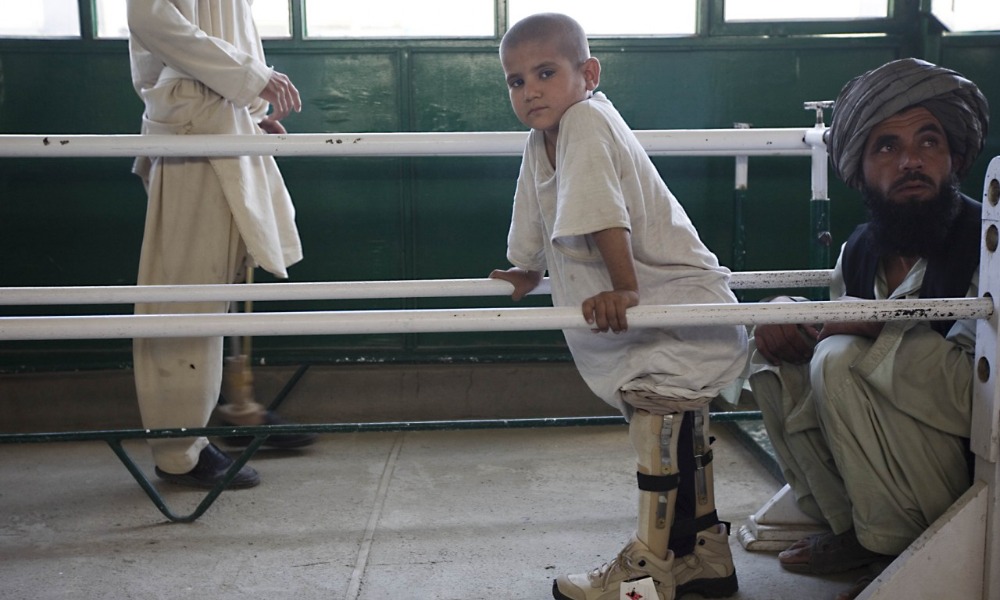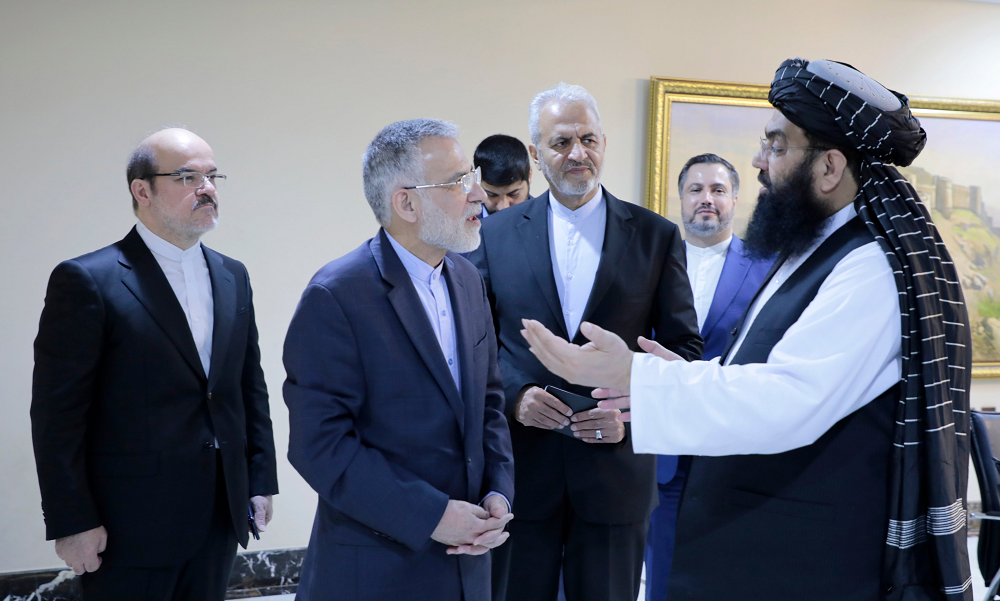Latest News
Rights watchdog survey finds 4.4 million Afghans live with a disability

The Afghanistan Independent Human Rights Commission (AIHRC) said in a report on Sunday 4.4 million people in Afghanistan live with a disability and that the number people with disabilities has increased by 11.2 percent during the past 14 years.
The AIHRC data shows that 13.9 percent of the total population of Afghanistan (4,475,800) have been identified as people with disabilities.
“In 1384 (2005), this figure reached 2.7 percent of the total population of the country; thus, in 14 years, the number of people with disabilities has increased by 11.2 percent,” the report said.
The organization has recorded physical, mental, biological, and metabolic disabilities among the Afghan people.
Based on the findings of this study 1,042 (69.3 percent) of the 1,504 respondents have physical disabilities; 294 (19.5 percent, physical sensory disabilities; 42 (2.8 percent), biological and metabolic disabilities, such as diseases, including diabetes, and blood pressure problems; while epilepsy, autism, or mental and psychological impairments account for 68 (4.5 percent), and 58 (3.9 percent) of the people surveyed had additional disabilities, the report read.
The AIHRC, meanwhile, stated that war, explosions, arbitrary use of drugs, traffic accidents, non-observance of safety measures in homes, not being vaccinated and shortfalls in maternal healthcare during pregnancy were identified as the main causes of disabilities in the country.
The organization called on people and the government to support people with disabilities as they “are among the most vulnerable layers of the society.”
According to the AIHRC findings, 573 (38.1 percent) of those who participated in the study reported that they had experienced violence at home and in the community because of their disability and that they have been insulted, mocked, and harassed.
“Among those who were abused and subjected to insults, humiliation, and harassment, 14 (2.4 percent) were victims of physical violence in the home and community, and 391 (68.2 percent) were deprived of support by family members, people, and government; 127 people (22.2 percent) were humiliated and insulted, 18 people (3.1 percent) were barred from entering public places and public gatherings, and 23 people (4 percent) were banned from traveling and socializing with friends and relatives,” the report said.
Latest News
Pakistan urges global community to block arms flow to militant groups in Afghanistan

A Pakistani diplomat on Saturday called on the international community to block the flow of modern and sophisticated weapons to militant groups in Afghanistan.
“Terrorist armed groups are in possession of billions worth of illicit arms abandoned in Afghanistan,” Syed Atif Raza, a counsellor at the Pakistan Mission to the UN, told an Arria-Formua meeting of the UN Security Council, convened by Sierra Leone.
“We call upon our international partners to recover the vast stockpile of abandoned weapons, prevent their access to armed terrorist groups and take measures to close this thriving black market of illicit arms,” he said.
Pakistani officials have repeatedly claimed that attacks in the country are planned in Afghanistan and that militants use weapons left behind by foreign forces.
The Islamic Emirate, however, has denied the claim, saying Afghanistan is not responsible for Pakistan’s “security failure”.
Latest News
Gandapur says no Afghan refugee will be ‘forcefully’ expelled from Khyber Pakhtunkhwa

Amid rising tensions over Pakistan’s repatriation plans for illegal Afghan nationals, Khyber Pakhtunkhwa Chief Minister Ali Amin Gandapour said on Friday that no refugees will be forcibly deported from the province.
“We will not allow any Afghan refugee to be expelled by force from Khyber Pakhtunkhwa. We stand firmly against such inhumane deportations,” Gandapur said at a press conference.
The remarks came as the Pakistani government ramps up efforts to repatriate undocumented Afghan refugees and Afghan Citizen Card (ACC) holders, following the expiration of the voluntary return deadline on March 31, 2025.
“The past situation, where Afghan refugees, including women and children, were stranded at the border, tarnished Pakistan’s image,” Gandapur said, reaffirming the provincial government’s commitment to a dignified repatriation process.
“We are setting up camps for voluntary repatriation, and anyone wishing to return will be helped. However, we will not forcibly expel any Afghan refugee,” he stated.
Afghans holding Afghan Citizen Cards (ACC) — issued by Pakistan authorities and held by 800,000 people, according to the United Nations — face deportation to Afghanistan after the deadline.
More than 1.3 million Afghans who hold Proof of Registration (PoR) cards from the UN refugee agency, UNHCR, are also to be moved outside the capital Islamabad and neighbouring city Rawalpindi.
Latest News
IEA has 46 township plans for returnees, minister tells visiting Iranian official

The Islamic Emirate of Afghanistan (IEA) has 46 township plans for returning refugees, Acting Minister of Refugees and Repatriation Mawlawi Abdul Kabir told a visiting Iranian diplomat in Kabul, calling on Tehran to give refugees time to return.
According to a statement issued by the ministry on Saturday, Abdul Kabir said during the meeting that Afghanistan and Iran are friendly neighbors that have many commonalities.
He stressed the need to further develop and strengthen relations between the two countries and said that the frequent visits of high-ranking Iranian officials show that Tehran wants positive and friendly relations with Afghanistan.
Abdul Kabir thanked Iran for its assistance and hosting of Afghan refugees, saying that Iran and Pakistan have been hosting Afghan refugees for the past few decades. He called for more leniency in the treatment of migrants.
He said that the Islamic Emirate is preparing a mechanism to provide legal documents for those migrants whose legal residence in Iran has expired.
In the meeting, Mohammad Reza Bahrami, Iran’s new Assistant Minister and Director General for South Asian Affairs at the Foreign Ministry, invited Abdul Kabir to visit Tehran, and called for repatriation plan to be shared before the trip.
He stressed on the humane treatment of Afghan refugees and appreciated the Islamic Emirate’s initiative to build 46 townships, calling it an important step forward for the return of refugees.
Bahrami noted that there are currently eight million Afghan reguees living in Iran, of whom four million are undocumented or have their residence expired.
-

 Latest News4 days ago
Latest News4 days agoAfghanistan’s reconstruction is in the interest of EU: Uzbek president
-

 Latest News4 days ago
Latest News4 days agoUS won’t rest until all Americans detained in Afghanistan brought home: Rubio
-

 Latest News3 days ago
Latest News3 days agoMinistry of Economy calls on US to release Afghanistan’s frozen funds
-

 Latest News4 days ago
Latest News4 days agoBulgaria brings five people to trial over deaths of 18 Afghan migrants
-

 Latest News3 days ago
Latest News3 days agoPakistan ‘extends’ deadline for a week for Afghans to leave the country
-

 Regional5 days ago
Regional5 days agoChina launches military drills around Taiwan, calls its president a ‘parasite’
-

 Business4 days ago
Business4 days agoGold climbs to record high as tariff worries bolster safe-haven demand
-

 Sport4 days ago
Sport4 days agoIPL 2025: Batters in race for prestigious Orange Cap

























